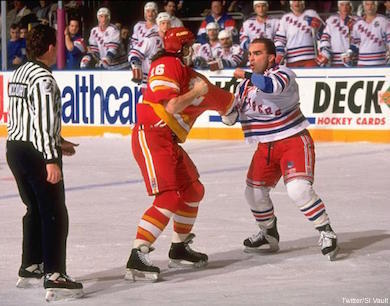Tie Domi scans the crowd at the Four Seasons in New York. It is a modest showing of approximately 100 people for the U.S. launch of Domi's memoir, Shift Work, as the NHL legend has reserved the event for close friends and family.
Domi's celebrity buddies are present. Alex Rodriguez is in the house. So is Mario Lemieux, who made the trip with Domi from Ontario. Billionaire businessman Nelson Peltz (he revitalized Snapple in the late 90s) leans on a windowsill. Victoria's Secret model Daniela Braga strolls in. Floyd Mayweather Jr. enters a few minutes later, draped in a shawl.
Domi ignores them. They are not the reason he is hosting this event.
"There's one guy that's here, who works in this hotel," Domi says. "He's a waiter for 20 years. Imagine here, the attitudes he deals with every day in this hotel."
Domi calls up Milton Ahmed, a Four Seasons employee. Ahmed trots to the front of the room, his family accompanying him with grins on their faces. Next, Domi introduces Joe, a bellman at the Four Seasons. Joe is followed with a introduction to Elisabeth, an employee of Porter Airlines at Newark Airport.
"You are the best," Elisabeth says.
Rod, a shoeshiner at Manhattan's Waldorf Astoria, gets his shoutout. The suit-clad crowd chuckles at Domi referencing the Four Seasons being his New York hotel of choice, but the Waldorf Astoria being his shoe shining destination.
Domi rounds up some others, and finally calls up Rodriguez, Lemieux and Peltz. Now, it is time for the two groups of Domi's friends to meet and take a picture together.
It is hard to believe that the man merging two walks of life is also the NHL's all-time leader in fights (338). Well, hard on the surface level.
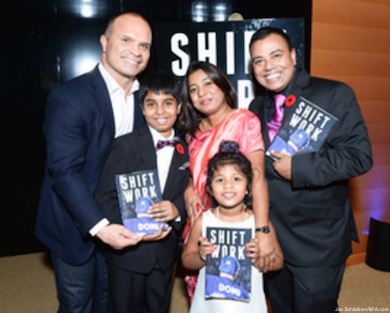
When Simon & Schuster came to Domi, who retired in 2006, about writing a book, the publisher assumed it could nail down the story of the sport's toughest player and then some. It did not know how big that "some" would be.
"I said I don't want to talk about having the most fights in NHL history," Domi says. "That was my job. That was to protect my teammates. That's what I did. I don't want to talk about it."
Domi's Albanian father and half-Albanian, half-Turkish mother were Canadian immigrants, not exactly the background you'd expect for someone who turned into a premier NHL enforcer at 5-10. This is the story many people know, but not the one Domi wants to tell. He wants to explain the other side of the human they created.
"I'll give you my childhood, my junior career, my NHL career quickly, but more importantly, my experiences after hockey," Domi told Simon & Schuster. "The way I see people treat coffee shop people, bellmen, waiters, TSA people, people at the airport, ticket people, parking people, security people, I want to talk about it. They said 'Well, it's a great idea.' I said, 'Well, it's the only way I'm doing a book.'"
Domi devotes a chapter of Shift Work to Milton, Joe, Elisabeth, Rod and the off-the-cuff friends he has made, outside of the public eye.
"It's about the way people want to be treated," he says. "Old school values"
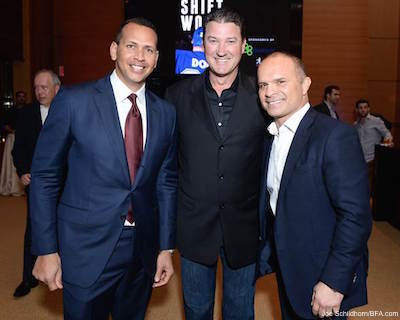
This is the same guy that used to pulverize opponents for 16 NHL seasons. Domi has the third-most penalty minutes of all time. He had 37 penalty minutes in his NHL debut for the Maple Leafs in March 1990 (he got into a fight on his first NHL shift). Domi then spent two and a half years with the New York Rangers, defending future Hall of Famers Mark Messier and Brian Leetch before improving his offense in two seasons as a Winnipeg Jet. Domi spent his final 10 1/2 seasons back in Toronto, where he was known as one of the game's most feared players.
Fighting gave him his reputation, but he did not think of it that way.
"I didn't really care what defined me," he says. "I was all about my team and winning. I played the most playoff games in the last four decades in Toronto Maple Leafs history. I'm pretty proud of that. Everybody knows me for having the most fights, but I played a lot of games."
Talk to Domi about his fellow enforcers, and his giddiness comes out. Domi's job was to go toe-to-toe with these other bone-bruisers, most much taller than Domi. The mutual respect is something that goes unnoticed under the punches and hip checks.
"That's why every guy I fought I put in my book," he says. "What they believe in, they're all about the team. I want to make a positive for all those guys because those guys did what I did and it's not easy to do it."
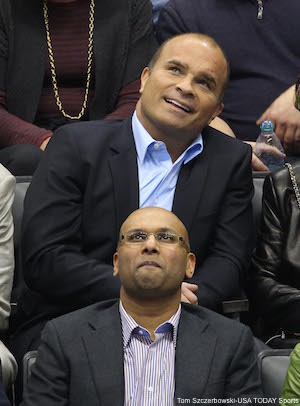
Domi understand how the NHL game is changing with enforcers being replaced by more skilled players on third and fourth lines. In 2003-04, fighting reached a 2000s peak of 0.71 fights per game. In 2014-15, the NHL only averaged 0.35 fights per game. Fighting reached an all-time high at 1.31 fights per game in 1987-88.
"I think this generation, everybody has a hit me tag on them and there's no accountability unless the league comes down on them hard," Domi says. "That's what I did. That's what all these guys in the book did."
Domi does not blame Gary Bettman, who became NHL commissioner in February 1993. He says Bettman is doing a "great job," pointing to the punishment of Raffi Torres this season. After an illegal check in this year's preseason, Torres was suspended 41 games -- his fifth NHL suspension and the longest for a hit on another player.
One team that is not ready to take the keys away from enforcers is the Arizona Coyotes, who happen to be the club of Max Domi, Tie's 20-year-old son. Max, the 12th pick in the 2013 NHL draft, is second among rookies with 16 points.
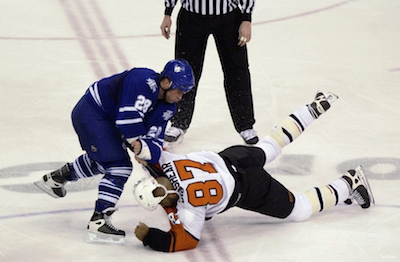
"John Scott and Steve Downie being in Arizona with Max, for me, that's a good feeling," Domi says with a smile about fellow tough guys, laughing about how Max plays more of a skill position game. Max is yet to fight in 20 NHL contests. "I don't really see many teams having those guys anymore, and you do have to protect scorers. My son, in junior hockey the last four years, and I watched him in the World Junior Championship (in 2015), they try to kill him. As a father, who tried to protect guys like my son, it was tough to watch."
Along with watching his son, Domi has business interests in Toronto. He spends time on Bay Street, the Toronto equivalent to Wall Street. However, he has had an up-and-down road.
"I actually went through a lot in 2008," he says. "Guys took my money. They used me to raise money. I went through tough times. That was the hardest punch I took. I was always good at business since I was 23 years old. It took my mind off fighting. I put my walls real high, kept my networks together. That translates to business. What you got is your loyalty and your trust and that's what works. That's what I do. I consult. I put synergies together. If I bring value, that's what I do. I deal with only selective companies. I'm very careful with companies I choose to be around."

Domi found an ally in Peltz, a founding partner of Trian Fund Management, L.P. Peltz is currently the non-executive chairman of the Board of The Wendy's Company.
Life has taken Domi through many doors. The son of immigrants became an NHL enforcer-turned businessman-turned writer.
Most important to Domi, he became a friend to a variety of individuals.
"I'm from Bangladesh," Ahmed says. "I didn't know him. I treat him the way I treat the other guests. The last three years, he said, 'Why are you so nice to me? Why do you help me all the time?' I said, 'That uniform means so much to me because the most important thing is for your first impression and your last impression."
Hockey player or waiter, some goals stay the same.
"At the end of the day, if you keep your feet on the ground, stay real and stay humble, you've got your integrity," Domi says.
This, coming from a man whose job was to keep opposing players off their feet.
-- Follow Jeffrey Eisenband on Twitter @JeffEisenband.


